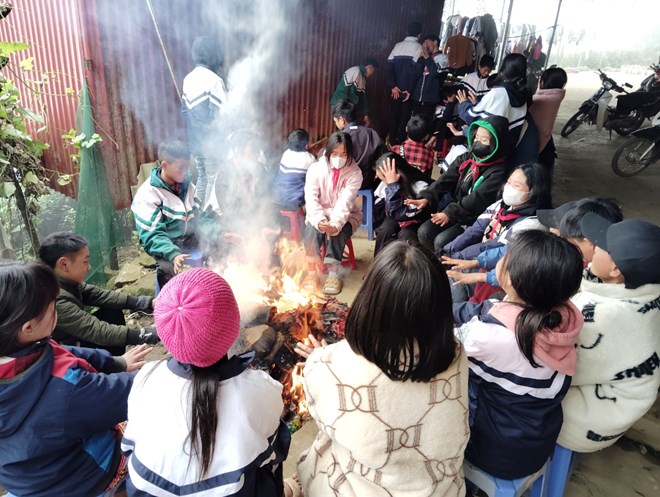On the winter morning, cold air flooded in, causing the whole city to be submerged in thin fog.
On the 15th floor of an apartment in a new urban area in Hanoi, Mr. Nguyen Van Hoa (41 years old, from Bac Giang, now Bac Ninh) woke up early to prepare warm clothes and sweaters for his two children to go to class.
Besides the wind blowing through the glass doors, he unconsciously recalled the small winter days.
Mr. Hoa was born into a large family in the old Son Dong district. Early in the morning, when it was still dark, his mother grouped the kitchen, quickly roasted a bowl of cool rice with a little fat and pickles.
One day, when she wanted her children to go to school early, she beat them to an egg, a rare thing for children in poor rural areas in the 90s.
"That day, it was pouring rain and wind, I only had a pair of warm sandals and a hand-carved sweater. Her mother applied a plastic sheath to her to keep her warm. Sitting on the ground, the wind recedes through several air vents at the foot of the wall, cold to purple all over the hands," Mr. Hoa recalled.
After studying until 10am, the children were on an empty stomach but still tried to copy the lessons.

"I don't know why I was able to grow up with little rice and thin clothes that day. Not because the bowl of fried rice was better that day. And because it was my mother's meal, at a time when I gave my child everything I could," he laughed, his eyes wide-opened as he talked about me.
Also growing up in the poor winter days, Ms. Bui Thi Hang (31 years old, from Hoa Binh province, now Phu Tho province) clearly remembers the foggy mornings covering the whole valley.
The house is crowded with brothers and sisters, there is not enough rice, many days the mother only boils a small pot of potatoes for her children to bring to class.
"Each person gets a potato. Stepping up the hill to school, cold feet, holding hot potatoes in your hands but still shaking. But just eating boiled mother potato leaves is enough to keep you warm all day," said Ms. Hang.
The classroom is a painting house, with earthen walls, soil, and fog so thick that the schoolyard is not clearly visible. The children have dirty feet and thin shirts, but they all try to go to class because they love their parents for their hard work.
"Now I send my children to a clean, warm school right next to my house. Life has changed, all the things are more fulfilling, but every time the weather gets cold, I remember my childhood in the cold of the mountains with the hot boiled mother potato, gathered by the brothers and sisters", Ms. Hang said.
In the midst of the first cold air of the season, in the apartments, the children get ready to go to school. Alongside them are the fathers and mothers who have gone through the days of poverty, carrying memories to remind themselves to live decently and teach their children to appreciate what they have.
For Mr. Hoa and Ms. Hang, today's cold is just the weather. The cold of the past, with fried meals, hot potatoes, pairs of welded sandals and plastic sheets, was a part of their childhood, a rustic love that nurtured them through difficult years.











